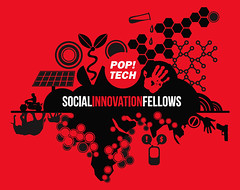 The Skoll Foundation, started by Jeff Skoll of Ebay, is focused on changing the game for social change and entrepreneurism.
The Skoll Foundation, started by Jeff Skoll of Ebay, is focused on changing the game for social change and entrepreneurism.
In fact, the label "social entrepreneur" is the nom de guerre in the current war on poverty, disease, conflict and intolerance, with the long-time foot soldiers finally gaining popular acclaim.
Last year, the man who is oft cited as the prototype of the modern social entrepreneur was awarded a Nobel Peace Prize: Muhammad Yunus, founder and manager of Grameen Bank and its growing family of social venture businesses in Bangladesh.
Fast Company has dedicated entire issues to celebrating Social Capitalists who've used business savvy and social conscious to create successful ventures that reap an ROI tracked in the new gold standard of success: The Triple Bottom Line. Business school students are emailing their parents, declaring that they are going to take their $200,000 education and start a business selling eyeglasses to Haitians. Oh, and make a ton of money doing it.
Heck, even the Oscars were declared green this year! [details]
With all this good press, an very self-reflective and worried conversation is taking place on-line at the Skoll Foundation's project site, The Social Edge. Social entrepreneurs are having a moment of doubt as to the depth of this perceived global change.
As the topic itself becomes more popular, more mainstream, more Hollywood, will this spotlight yield practical leaders who can effectively leverage the emergent power of social media to mobilize decentralized activity in combination with true political will to lead change in policies and regulations on a global scale?
Changing the World is Not Enough
Is social entrepreneurship ready for the real challenge?
by Social EdgeAs a social entrepreneur, I worry. Changing the world through the work of one social entrepreneur at a time is not good enough. Improving life for even one person is worthy. It changes the world…one heartbeat at a time. And sooner or later, as life for enough people is changed for the positive we will reach a tipping point beyond which the entire world will change itself into a better place. I believe this will happen, given time.
But what if it doesn’t happen soon enough? What if we don’t have the time it will take? What if the world tips the other way first? Some days, for every tip toward a better world there is an opposite and greater tip toward a horrific world. What if those days overpower the good days?
A new wilderness is engulfing us. How we see this forest for its trees and who leads us through it could make the difference between life and death for civilization as we know it.


















